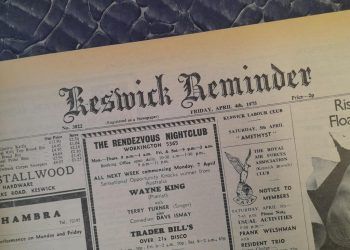
Nobbut Laiking, by Ross Brewster
When it comes to ministerial jobs in government, doors seem to revolve faster than at the Ritz.
It’s good to freshen things up with the occasional new broom, but departments are being presented with new ministers at a rate of nearly one per year.
To any sensible person this revolving doors syndrome is ludicrous. No sooner has a minister fired off a few magic bullets they are either sacked or trotting around to Downing Street for a promotion.
The extraordinary turnover rate was highlighted when two Cumbria farmers were on the platform at Oxford Farming Conference taking part in a national debate over food production and the environment.
Will Cockbain from Keswick mounted a sterling defence of sheep farming while Julia Aglionby, the Lib Dem parliamentary candidate for Penrith and Solway, highlighted the fact that there have been 10 secretaries of state in 13 years at Defra.
Appointed in November, the new man at the Department for Environment, Food and Rural Affairs, Steve Barclay, was only recently at the forefront of the wrangling with striking junior doctors over pay. At least he comes from a rural constituency in Cambridgeshire which holds out some hope that he understands the farming element in his brief.
It has been fairly evident to anyone with an interest in farming and the countryside that a proportion of those ministers were totally unsuited to the role or have demonstrated barely disguised disinterest. The record for brevity of stay was the secretary of state who, in 2022, was in post for four whole weeks.
The same could be said for other key government departments like education, health and transport. Very few ministers are around when the consequences of their policy decisions are felt.
As an example, at education there have been 23 secretaries of state since 1981 and 10 since 2010. So a child entering school at four will have been subject to the whims of an average of seven secretaries of state by the time they reach 16.
Equally disconcerting is the proclivity of the Government to perform U-turns, with HS2 an example. No wonder people charged with carrying out ministerial wishes feel they don’t know if they are coming or going.
One letter writer in the Guardian described the “enormous churn” of ministers, at the same time questioning their professional background in education.
I’ve complained before about short-termism. Governments of all shades rarely look beyond their five-year stint. For most of those given ministerial roles, 18 months can seem like a long time and in consequence a lot of ideas are scrapped before they’ve had time to prove or disprove their worth.
Cumbrian commonsense at last week’s conference apparently does not extend all the way to Whitehall.
Putting in some Bard work
He’s been hailed as “one of the supreme Shakespeare directors of our era.”
So who better to furnish me with my festive season reading and an opportunity to brush up on my limited knowledge of the Bard’s work than a former artistic director of Keswick’s famous old Blue Box theatre, Gregory Doran.
It reminds me of Cole Porter’s song Brush Up Your Shakespeare, written for the musical comedy Kiss Me Kate. “Brush up your Shakespeare, start quoting him now. Brush up your Shakespeare, and the women you will wow.”
Greg Doran directed three plays during the Blue Box’s final season before it was replaced by the swish building which stands on the lakeside site today.
In his new book, My Shakespeare, he recalls seeing an advert for the Keswick theatre and being attracted by its spectacular location and the fact his parents had recently retired to the area. His interview with grand old actor-manager Wilfred Harrison turned into a lengthy discussion about Shakespeare.
Doran left peremptorily when the call came from the RSC to direct at the Swan in Stratford. In his place came Ian Forrest and Patric Gilchrist who went on to create a phenomenal success story in the new theatre over many years, while Greg rose to dizzying heights at the Royal Shakespeare Company.
The actor Donald Sinden once quipped “man cannot live by Bard alone”. Doran says Shakespeare has been a “passport through my life”, so he’s made a fair job of it.
Have you ‘re-gifted’ a scented candle?
How are you off for scented candles after Christmas?
Remember when they were the must-have new thing in the shops as people snapped them up to give as presents. No room in an orderly middle-class residence was complete without that familiar sickly smell.
But now nobody seems to want them. In fact scented candles, and those little bottles of liqueurs, are the prezzies at the top of the tree when it comes to re-gifting.
The thing about candles is they don’t wear out and, as a rule, bear no obvious identification. One scented candle is as good as another scented candle.
But beware. Those nice people who sent yours might have some fiendish way of marking them. So next Christmas, when their gift is returned, they will know just what a cheapskate you are.
Still, after that there will be no more present exchanges, fewer friends and no more scented candles.








